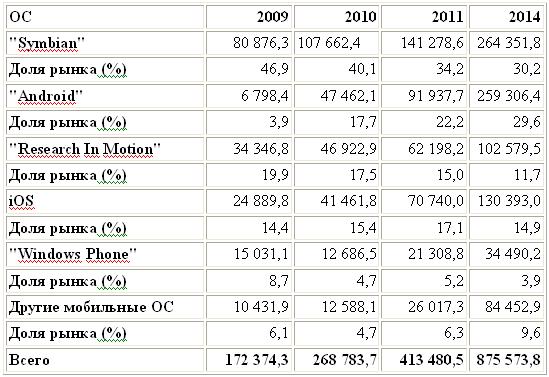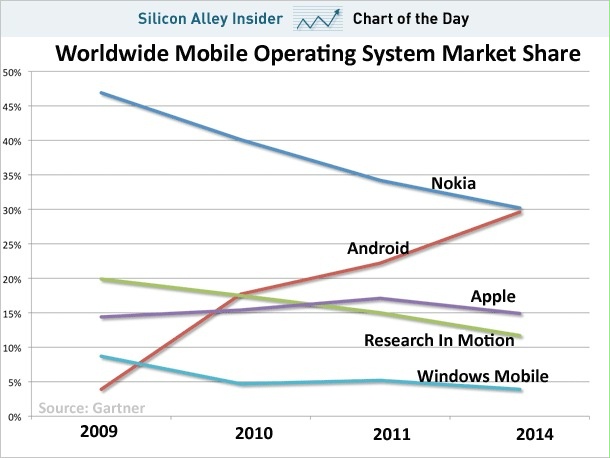Market forecast for mobile operating systems
According to the latest Gartner estimates, before the beginning of 2014, the operating systems market for mobile devices will be dominated by such operating systems as Symbian and Android. Estimated number of mobile devices with OS data among the sold mobile terminals for the year will be approximately 59.8%.
Thanks to the large sales of Nokia devices and the active promotion of its devices in the budget segment, the leadership will remain behind the Symbian operating system. However, by the end of the period, the Android OS will be the leader. Phones with Android operating system, perhaps, before the end of this year will move to second place in popularity in the world.
According to forecasts of experts, until 2014, open source platforms will occupy up to 60% of the smartphone market. In turn, closed platforms such as iOS and RIM will increase the number of sales, but the rate of revenue growth will be lower than the general market and insufficient to increase market share.
Analysts believe that the global market for mobile operating systems is currently represented by four major players: Symbian, Android, Research In Motion and iOS. Performing updates for the specified OS (Apple iOS 4, BlackBerry OS 6, Symbian 3, Symbian 4 and Windows Phone 7) , according to experts, will contribute to the further growth of the smartphone market during the second half of 2010 and early 2011.
Table 1. Forecasts for the supply of mobile devices (thousand pieces) with installed OS to end users:

According to an earlier forecast, the mobile OS iPhone OS may lose leadership and skip ahead of Android by the beginning of 2012. According to analysts, Android OS in 2 years can be installed on 75 million devices, and iOS, in turn, only 62 million.
Thus, Android to increase the market share by 19.4% (2.7% in 2009). The share of Apple iOS will be only 15.9% (13.8% in 2009). For the Android OS until 2014, this figure can still grow and reach 22.8%, while the share of iPhone OS - to fall to 15.3%.
According to experts IDC, until 2013, the Symbian OS can maintain leadership, when the largest increase in the market share will show the Android operating system Google.
According to experts, in the coming three years, global purchases of smartphones will increase to 390 million devices, showing an annual increase of 20.9% in the period from 2009 to 2013. The consequence of this will be that the mobile operating systems market, once formed by such "pioneers" as BlackBerry, Symbian and Windows Mobile, will begin to shift towards newcomers using open source (Android) standards and an intuitive interface and navigation (Mac OS X And webOS).

IDC predicts that until 2013 Symbian OS will be able to retain its leading position, mainly due to strong positions in the international market of the Finnish company Nokia. Android will show a very fast growth rate of its share.
In 2008, the number of users of the Android OS was only 690 thousand, but according to forecasts until 2013 the total number of mobile devices from this OS can reach a quantity of 68 million pieces, which is 150% of the market share growth. Operating systems based on Linux will gradually lose popularity, due to pressure from the competitor with open source - Android. Palm webOS, in spite of stable growth, will occupy a rather modest niche, mainly due to limited access to devices from various telecom operators.
It is expected that the global market for converged mobile devices (smartphones) this year will grow by 55.4% compared to last year due to greater than expected demand for these devices. This is 10% higher than the previous IDC forecast based on Worldwide Quarterly Mobile Phone Tracker data.
IDC now expects that vendors will deliver 269.6 million units this year. Converged mobile devices against 173.5 million units. last year. IDC increases its forecast against the background of the release of several new models - BlackBerry Torch, EVO 4G and iPhone 4 - in recent months.
"The smartphone is a catalyst for the revival of the global mobile phone market this year," writes Kevin Restivo, senior research analyst at IDC Worldwide Quarterly Mobile Phone Tracker. "The introduction of new products and the expected revival of purchasing activity in this segment in the second half of the year will push the market much higher than the previous expectations."
During the first half of 2010, vendors delivered a total of 119.4 million units. Devices, or 55.5% more than in the first half of 2009 (76.8 million units).
"The global smartphone market continues to grow at a high rate, and the dynamics of the relationship between mobile operating systems continues to change," writes Ramon Llamas, senior research analyst, Mobile Devices Technology and Trends, IDC. - Longtime leaders among the OS - BlackBerry, Symbian and Windows Mobile - are getting ready to go out or have already come out in new versions to compete with recent novices, Android and iOS. The latter two attracted the interest of consumers, taking away the market share from the old guard, and helped move the market further. "
"Android is a new OS that deserves close attention during the remainder of this year and beyond," Mr. Llamas further writes. - Vendors of phones began to move to Android, because this OS allows them to offer their own approach to how the user interface of the smartphone should look. In addition, users quickly warmed to Android, comparing it with iOS, due to the ease of use and growing showcase of mobile applications. Now that HTC and Motorola have come to the fore with their models, other vendors - Dell, Kyocera, LG Electronics and Samsung - will soon also help grow the Android market. "
Accelerating growth in the smartphone segment will help improve the market as a whole this year. IDC now expects that the mobile phone market as a whole in 2010 will grow by 14.1%, that is, 1.5% higher than in the previous forecast. Last year, the market had a decline of 2.8%, for the first time in the history of the Mobile Phone Tracker.
The outlook for 2011 also looks very strong. Despite the uncertainty in the economy, it is expected that in 2011 the smartphone market will grow by 24.5%. However, this growth will gradually decline over the five-year forecast period. Thus, in 2014, the market is expected to grow by only 13.6%.
Nevertheless, there is enough room for the growth of many players. No mobile OS will dominate the way Windows does on personal computers. "IDC believes that the market will easily support up to five mobile OS over the next five years," writes Mr. Restivo. "Shorter replacement cycles and an abundance of upgrade opportunities from a dedicated phone to a smartphone mean that the mobile OS market will remain fragmented, but quite healthy in the foreseeable future."
Symbian will retain its leader position during the forecast period with a market share of 32.9% in 2014. However, it will lose its share, mainly in favor of Android, which is expected to increase its share faster than others in this period, increasing it From 16.3% to 24.6%. It is also expected that Windows Mobile will regain some of the market share lost in the last two years, and the BlackBerry's share will remain relatively stable, while the share of iOS will gradually decrease.


Comments
When commenting on, remember that the content and tone of your message can hurt the feelings of real people, show respect and tolerance to your interlocutors even if you do not share their opinion, your behavior in the conditions of freedom of expression and anonymity provided by the Internet, changes Not only virtual, but also the real world. All comments are hidden from the index, spam is controlled.